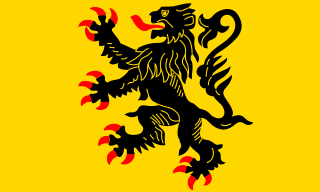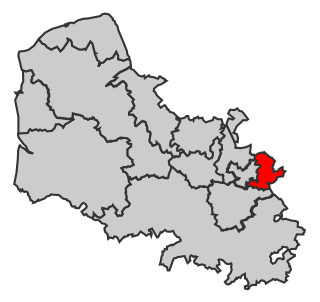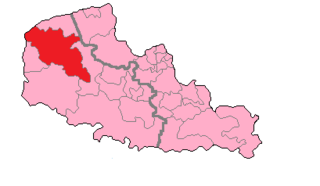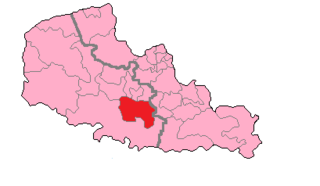
Nord-Pas-de-Calais ; Picard: Nord-Pas-Calés); is a former administrative region of France. Since 1 January 2016, it has been part of the new region Hauts-de-France. It consisted of the departments of Nord and Pas-de-Calais. Nord-Pas-de-Calais borders the English Channel (west), the North Sea (northwest), Belgium and Picardy (south). Until the 17th century, the history of the North was largely in common with the history of Belgium, that of a land that "for almost a thousand years served as a battlefield for all of Europe." The majority of the region was once part of the historical Southern Netherlands, but gradually became part of France between 1477 and 1678, particularly during the reign of king Louis XIV. The historical French provinces that preceded Nord-Pas-de-Calais are Artois, French Flanders, French Hainaut and (partially) Picardy. These provincial designations are still frequently used by the inhabitants. The former administrative region was created in 1956 under the name "Nord" and maintained that name until 1972 when "Pas-de-Calais" was added. This remained unchanged until its dissolution in 2016.
An arrondissement is the third level of administrative division in France generally corresponding to the territory overseen by a subprefect. As of 2023, the 101 French departments are divided into 333 arrondissements.

Auxi-le-Château is a commune in the Pas-de-Calais department in northern France.

Marquise is a commune in the Pas-de-Calais department in the Hauts-de-France region of France.

Thièvres is a commune in the Pas-de-Calais department in the Hauts-de-France region of France.

Thièvres is a commune in the Somme department in Hauts-de-France in northern France.

The 13th constituency of the Pas-de-Calais was a former French legislative constituency which existed until 2012. It was one of 14 French legislative constituencies in the Pas-de-Calais department (62) located in the Nord-Pas-de-Calais region.

The 12th constituency of the Pas-de-Calais is a French legislative constituency in the Pas-de-Calais département.

The 11th constituency of the Pas-de-Calais is a French legislative constituency in the Pas-de-Calais département. It elects one député to the National Assembly. It has been represented by Marine Le Pen since 2017.

The 10th constituency of the Pas-de-Calais is a French legislative constituency in the Pas-de-Calais département.

The 9th constituency of the Pas-de-Calais is a French legislative constituency in the Pas-de-Calais département.

The 4th constituency of the Pas-de-Calais is a French legislative constituency in the Pas-de-Calais département.

The 6th constituency of the Pas-de-Calais is a French legislative constituency in the Pas-de-Calais département.

The 3rd constituency of the Pas-de-Calais is a French legislative constituency in the Pas-de-Calais département.

The 2nd constituency of the Pas-de-Calais is a French legislative constituency in the Pas-de-Calais département.

The 1st constituency of the Pas-de-Calais is a French legislative constituency in the Pas-de-Calais département.

The 8th constituency of the Pas-de-Calais is a French legislative constituency in the Pas-de-Calais département.

The Constitutional Council of France approved the redistricting of electoral boundaries in February 2010 to reflect France's changing demographics. The population ratio between the most populated and least populated constituencies was reduced from the 1986 redistricting results of 1:3.6 to 1:2. In effect, the number of seats increased in areas held by the centre-right coalition led by Union for a Popular Movement at the expense of the Socialist-led centre-left coalition. The 2010 redistricting process not only brought down the rule of two deputies per department to one, it also created eleven constituencies for French residents overseas.

Legislative elections were held in France on 11 and 18 June 2017 to elect the 577 members of the 15th National Assembly of the Fifth Republic. They followed the two-round presidential election won by Emmanuel Macron. The centrist party he founded in 2016, La République En Marche! (LREM), led an alliance with the centrist Democratic Movement (MoDem); together, the two parties won 350 of the 577 seats—a substantial majority—in the National Assembly, including an outright majority of 308 seats for LREM. The Socialist Party (PS) was reduced to 30 seats and the Republicans (LR) reduced to 112 seats, and both parties' allies also suffered from a marked drop in support; these were the lowest-ever scores for the centre-left and centre-right in the legislative elections. The movement founded by Jean-Luc Mélenchon, la France Insoumise (FI), secured 17 seats, enough for a group in the National Assembly. Among other major parties, the French Communist Party (PCF) secured ten and the National Front (FN) obtained eight seats. Both rounds of the legislative election were marked by record low turnout.
Marcel Cabiddu was a French politician.


















